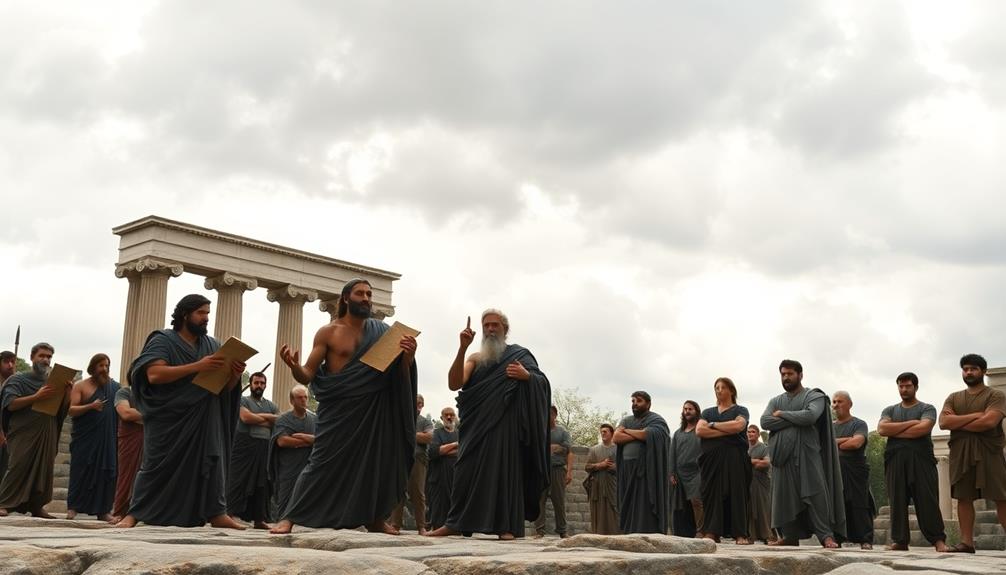In ancient Greece, thinkers debated if you're just a puppet of fate or truly free. Aristotle believed you can shape your choices, while Epicureans argued for freedom through chance. On the other hand, Carneades claimed that determinism creates an illusion of choice, stating that real freedom means you could choose differently. Stoics acknowledged fate but emphasized that rational deliberation influences your actions. Each perspective shapes your understanding of moral responsibility and human agency. If you're curious about how these views connect to modern implications, you'll find more intriguing insights worth exploring.
Key Takeaways
- Greek philosophers debated free will, with skeptics like Carneades arguing that determinism creates an illusion of choice, likening humans to puppets.
- Aristotle distinguished between effective agency and determinism, asserting that genuine deliberation influences outcomes, opposing the puppet analogy.
- Epicureans introduced the concept of atomic swerve, suggesting indeterminism allows for human freedom, challenging the notion of being mere puppets.
- Stoics accepted determinism but emphasized rational deliberation, arguing individuals can still act virtuously within a predetermined framework, resisting the puppet perspective.
- The intertwining of fate and moral responsibility in Stoicism reflects a belief in human agency, countering the idea that we are all just puppets.
Ancient Philosophical Perspectives

In ancient philosophical discussions, free will faced intense scrutiny, particularly among Greek thinkers. You'll find that philosophers wrestled with the balance between human freedom and determinism, raising critical questions about moral responsibility.
Aristotle distinguished between effective agency and determinism, laying the groundwork for later debates. The Epicureans and Stoics also contributed, exploring concepts like logical and causal determinism. Epicurus introduced the idea of atomic swerve, arguing that such randomness supports human freedom and counters fatalism.
On the other hand, Carneades took a skeptical approach, asserting that causal determinism undermines true freedom. He emphasized the necessity of being able to choose differently, which is essential for moral responsibility.
Meanwhile, the Stoics accepted determinism while asserting that rational deliberation can still occur in a predetermined universe. This idea suggests that even if events unfold according to determinism, human beings can still engage in meaningful decision-making.
Effective Agency vs. Determinism

The debate between effective agency and determinism centers on whether individuals can truly make choices if outcomes are predetermined. Effective agency, emphasized by Aristotle, argues that you need a sense of future openness to genuinely deliberate and act. In contrast, logical determinism raises doubts about your ability to act freely if every event is inevitable.
Epicureans countered this by introducing the atomic swerve, allowing for indeterminism and safeguarding human freedom. Carneades further challenged causal determinism, suggesting that if events are predetermined, true freedom of choice is an illusion. The Stoics found a middle ground, accepting both causal determinism and the Principle of Bivalence, asserting that even if outcomes are predetermined, rational deliberation is still an essential exercise of moral agency.
Here's a quick summary of key perspectives:
| Philosophy | View on Determinism | View on Effective Agency |
|---|---|---|
| Aristotle | Rejects | Supports |
| Epicureans | Rejects fatalism | Supports |
| Carneades | Opposes | Emphasizes choice |
| Stoics | Accepts | Supports rationality |
These views highlight the tension between your perceived freedom and the constraints of determinism.
Moral Responsibility Debates

Moral responsibility hinges on whether you can genuinely claim ownership of your actions in a world that might be bound by determinism. Ancient Greek philosophers, particularly Aristotle, argued that moral responsibility is tied to voluntary actions that stem from your beliefs and desires. This distinction is essential; involuntary actions, influenced by external factors, undermine your accountability.
However, psychological determinism challenges this notion. It suggests that your choices are shaped by past experiences and circumstances, which could diminish your moral responsibility. Carneades countered this by asserting that true freedom involves the ability to choose differently, thereby preserving your accountability.
Aristotle rejected fatalism, advocating that deliberation and action aren't futile. He believed you possess the capacity to influence outcomes, reinforcing the idea that your choices matter.
The Stoics, while acknowledging fate's role in determining outcomes, maintained that you can still engage in rational deliberation, suggesting a complex interplay between determinism and moral responsibility.
Ultimately, the debate centers on whether you can act freely and bear moral responsibility in a world influenced by psychological determinism. Your ability to choose, according to these ancient thinkers, is what defines your moral standing.
Stoic Views on Fate

Throughout history, Stoic philosophy has grappled with the concept of fate, asserting that all events, including human actions, are part of a divine rational order. The Stoics believed that everything unfolds according to God's power, weaving a tapestry of interconnected events.
Key philosophers like Zeno and Chrysippus emphasized that while outcomes may be predetermined by fate, you still possess the capacity for rational deliberation and moral agency. They upheld the Principle of Bivalence, arguing that every statement about future events has a definite truth value, reinforcing their deterministic worldview.
In this framework, accepting your fate and aligning your actions with the natural order becomes essential for achieving inner peace and virtue. The Stoics viewed attempts to defy fate as futile, urging you to focus on what lies within your control—your responses and choices.
Ultimately, Stoicism highlights the interplay between human action and divine fate. While you may not control the outcomes dictated by the gods, you can cultivate virtue and character. This acceptance of fate enables you to navigate life's challenges with grace, understanding that your responses shape your inner landscape even in the face of predetermined events.
Contemporary Implications of Determinism

Understanding Stoic views on fate sets the stage for exploring how determinism influences contemporary thought. You might find yourself questioning your own choices when you consider that many philosophers, from Aristotle to Epicurus, argue that our actions are predetermined by prior states of affairs. This raises serious concerns about moral responsibility.
Here are a few contemporary implications of determinism:
- Moral Responsibility: If your actions are dictated by biological or environmental factors, can you truly be held accountable?
- Personal Responsibility: You may struggle to reconcile your sense of agency with the idea that your decisions are influenced by forces beyond your control.
- Legal Accountability: Courts are increasingly considering the origins of behavior when determining justice, challenging traditional views on punishment.
- Social Perception: Society's understanding of personal agency shifts as we acknowledge the impact of determinism on our lives.
In a world where the gods love to intervene in our fates, it's crucial to reflect on how these ideas impact your understanding of your own choices. Embracing determinism can reshape your views on responsibility, both personal and moral, in profound ways.
Frequently Asked Questions
Do the Greeks Believe in Free Will?
You'll find that ancient Greeks had diverse views on free will. Some believed in it strongly, linking it to moral responsibility, while others leaned towards determinism, suggesting fate heavily influenced choices, complicating the concept of personal agency.
Was Everyone Treated Equally in Ancient Greece?
No, everyone wasn't treated equally in Ancient Greece. Citizenship was limited to free males, while women, slaves, and foreigners faced significant inequalities. You'd find disparities in rights and societal roles across different city-states.
Do Greek Heroes Have Free Will or Has Fate Predetermined Everything?
Imagine a puppet dancing on strings, caught between its own desires and the puppeteer's will. Greek heroes grapple with similar tensions; they endeavor for free will, yet fate often pulls them toward inevitable outcomes.
Did the Greeks Believe in Freedom?
The Greeks certainly believed in freedom, exploring how human agency influences moral accountability. They debated whether actions stemmed from choice or fate, emphasizing that true freedom involves the ability to deliberate and choose differently.
Conclusion
In the grand theater of life, you might feel like a puppet dancing on strings, but remember, your choices still matter. Ancient Greeks grappled with free will and determinism, shaping today's debates on moral responsibility. While some argue fate pulls the strings, your agency can still shine through the chaos. So, embrace your role; after all, you're not just a marionette in this cosmic play, but the star of your own show!









